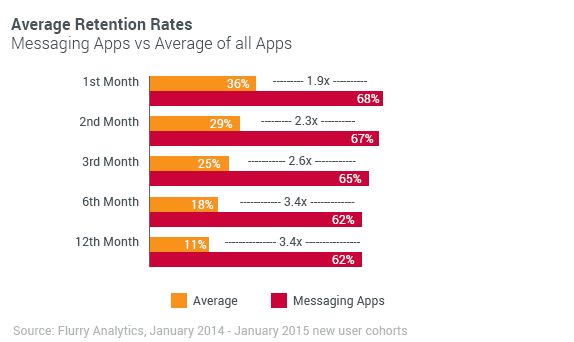Instant and free interaction remains a very important aspect in everyday life, iOS mobile app development as well as Android mobile app development have a huge potential for mobile app development companies.
Going into details, mobile messaging apps have 5.6x the user retention after a year after download in comparison to the average app. Below we present 10 popular and free instant messaging apps as well as stats and interesting facts about them.
The sustainability of iOS and Android mobile app development is also confirmed by another research, according to which messaging apps generate great app session launches. Analyst firm App Annie has analyzed smartphone trends in the UK, South Korea, Germany, Japan, and USA. The research shows that Android mobile app development for communication and social media total to over 50% of Android Smartphone sessions. Mobile app development companies drive more launches of messaging apps than any other app in South Korea and Germany.
Obviously, interaction is an extremely important factor for both users and software development companies. The former can take advantage of instant communication; the latter can encourage high user loyalty and numerous launches.
Today, mobile app developers offer multiple mobile messengers available across different platforms. Below you’ll find an overview of 10 popular and free instant messaging apps.
1. WhatsApp
WhatsApp messenger was initially an iOS mobile app development, adapted later for all major operating systems. This messaging app has 900m active users as of September 2015 with little marketing.
Thus, an average WhatsApp user sends 1,000 messages per month. This impressive user retention is attributed to the simplicity of the messenger. The app developers – Brian Acton and Jan Koum – equipped their iOS mobile app development with an extraordinarily easy functionality. As long as 2G, 3G, 4G, or Wi-Fi connection is made, users can send totally free text, photo, audio and video messages and communicate in group chats. What is very convenient, it is an option to synchronize all the contacts, messages, etc. across multiple devices. After the acquisition by Facebook, the app development company implements ad solutions in the app allowing businesses to send ads, images, etc. to users. It may also sound interesting that this iOS and Android mobile app development enjoys the greatest popularity in India.
2. Line
Mobile app development companies consider Line as the main rival of WhatsApp since Line is also available across multiple operating systems and devices (incl. computers) and ensures text, audio, video messaging, sending images, media sharing, group interaction. The owners of Line ordered the software development company to go beyond messaging. In 2014, Line Corporation purchased MixRadio from Microsoft in order to launch an online streaming music service.
Besides, Line is committed to e-commerce and online payment services. Perhaps, you will be surprised that this iOS and Android mobile app development operates as a taxi hailing and food delivery service in Japan. In short, Line app developers push the app to be “a platform for everyday life for all users online and offline”, the motto says.
3. Facebook Messenger
In order to reach more users, Facebook encourage them to get in touch with each other through their both iOS and Android mobile app development Facebook Messenger. The mobile app development company made it possible use the messenger even without a Facebook account. After entering a phone number, users can send and receive text, voice messages, calls, pictures and locations as well as interact with Facebook users in group chats. The app developers also offer payment services, though at the moment for users from the US only.
4. WeChat
WeChat has gone a revolutionary way on the Chinese mobile app market. The messenger has 1.1 bn registered accounts worldwide, only 100m are outside of China. It is not only a mobile app for messaging and social communicating but also a social service. This is an example for app development companies how to expand the scope of messaging app beyond communication.
The mobile app development company has transformed WeChat into a promotional platform for increased personal content sharing and spending money. Apart from text messaging and instant communication, WeChat has sparked gaming functions, m-commerce services as well as professional communication options for businesses and entrepreneurs.
Correspondingly, the user base of WeChat mostly consists of young people between 18-36 years old occupied in private sector, entrepreneurship and students. Today, Forbes estimates the mobile app to be worth $100 billion.
5. Kik Messenger
This is an iOS and Android mobile app development that uses usernames instead of phone numbers. The app engages mostly 14-17 year-olds while Facebook is used mostly by 21-25 year-old, businessofapps.com says. As of August 2015, Kik Messenger ranked 30 th in top free apps on the App Store. Like other messaging apps, Kik Messenger is moving toward expanding various services on top of messaging. Recently, Kik has received funding from the owner of WeChat so that Kik “will do in the West what WeChat did in China”.
6. Snapchat
According to Vodafone, telecoms carrier, this messaging app drives 75% of data traffic in the UK while Facebook Messenger and WhatsApp account for 25% of the traffic.
The iOS and Android mobile app development company focuses on sending heavy media and allows users to send photo or video messages with a short-based caption. After a user has opened the message, it will be deleted. The mobile app development company also offers an option to post longer messages through Snapchat stories.
7. Telegram
Telegram’s app development company positions this iOS and Android mobile app development as a simple and secure free messaging app. Telegram messages are encrypted and like in Snapchat self-destructive. The app is very popular in Europe, Latin America, South East Asia and the Middle East. Telegram is eager to get more launches and differentiates itself offering a free and secure service, which will never sell its data to third parties.
8. Viber
Viber operates on major computer and mobile systems and provides free text messages and calls. What makes Viber so popular is that the app doesn’t require user authorization and account connection. The messaging app performs synchronization with the contacts in the smartphone. Users can keep in touch with others sending instant personal or group messages, videos, images, participating in public chats, and making calls. Users can also call to non-Viber users using Viber Out. Viber’s app developers offer users a number of stickers, emotions, and photos.
9. Instagram Direct
The app development company has built Instagram Direct in order to let users share some moments in their lives with a smaller group of people. That’s where the shoe pinches. That’s the aspect which makes the app’s community grow. Users can send photos and videos either to a big group of people, or to specific people and see recipients commenting them in real time. Users take advantage of immediate delivery of the content. The app is both iOS and Android mobile app development.
10. CoMessenger
This is an iOS mobile app development (compatible with iPhone, iPad and iPod touch) for instant messaging. CoMessenger also allows users to unify their group contacts under one group. What lets CoMessenger stand out is its extra feature – communities. The app development company has ensured that users can integrate CoMessenger with 3d party mobile apps through inserting a code. Mobile apps devoted to specific topics like music, sports, etc. will be displayed among community members. Thus, users can save time and efforts without a necessity to create new chats.
Elinext Alliance mobile applications:
Messaging Mobile App “CoMessenger”
Flower Monitoring Mobile App Case Study
nPassword Case Study
Mobile application for iOS
Industries and Technology Areas:
Industries: IT
Technology Areas: software development, mobile application development, iOS, Android










